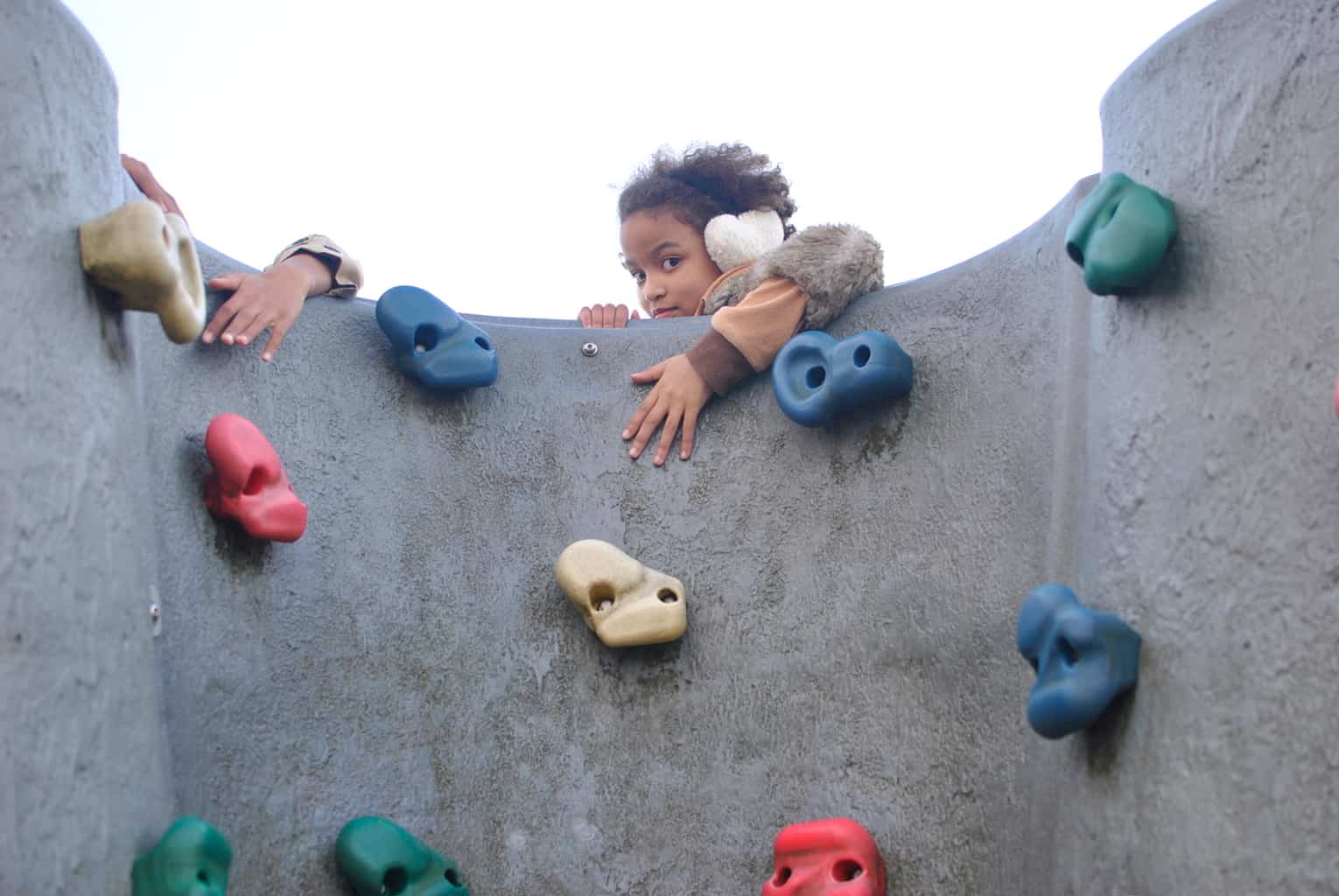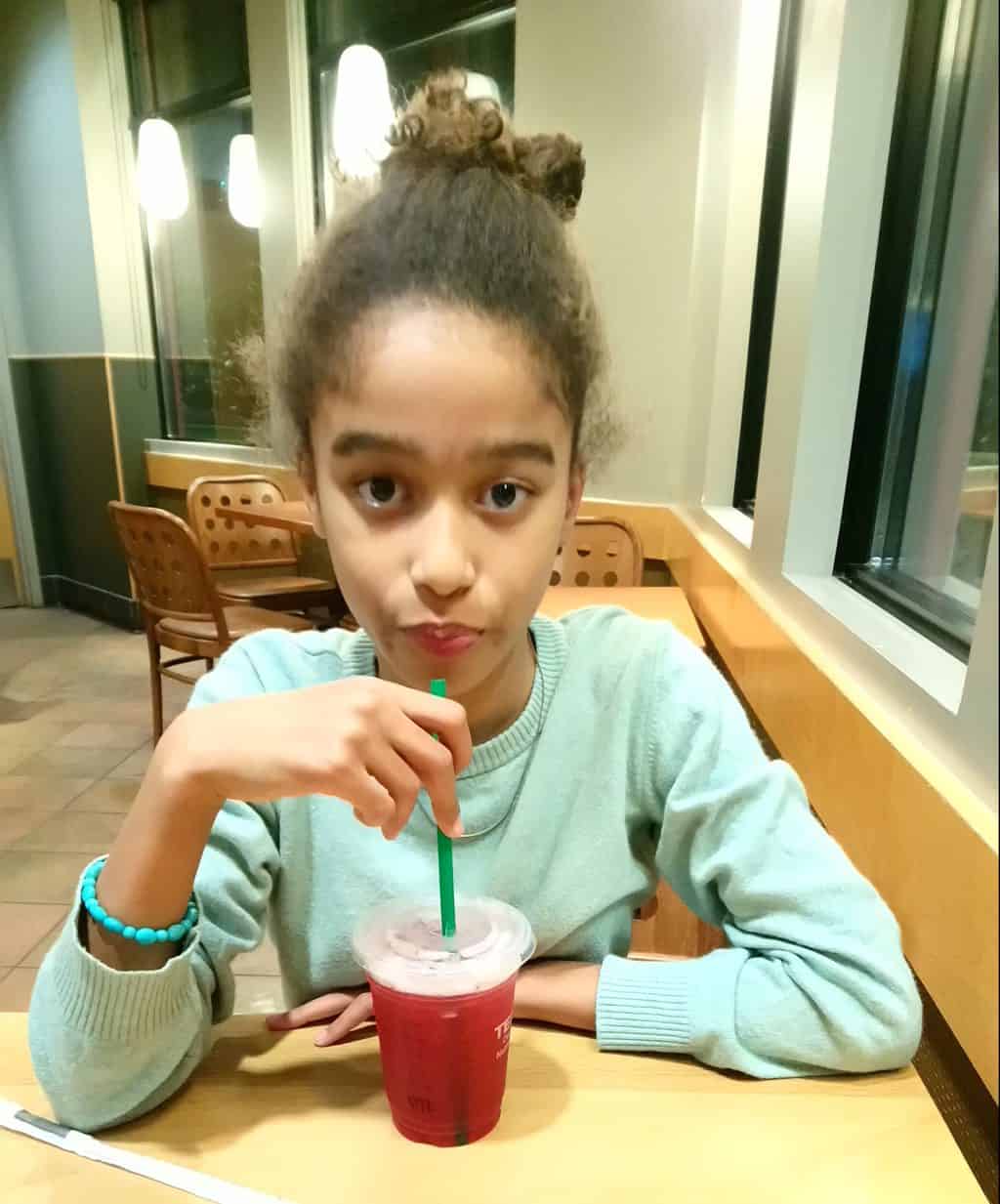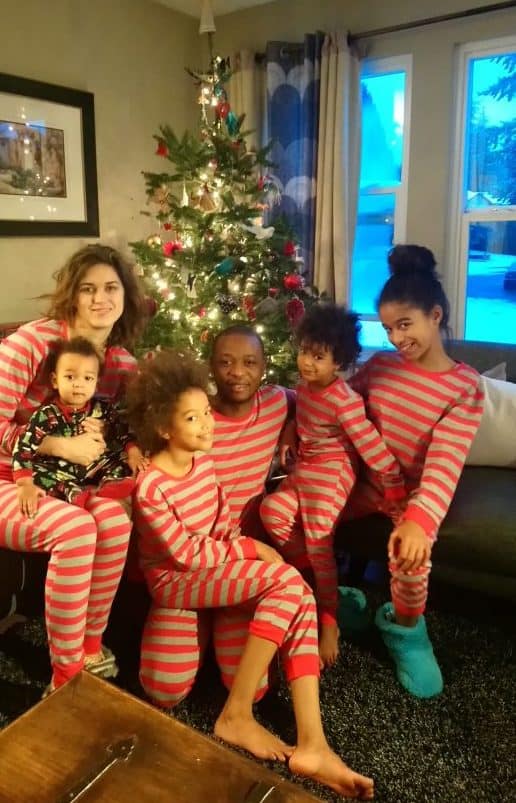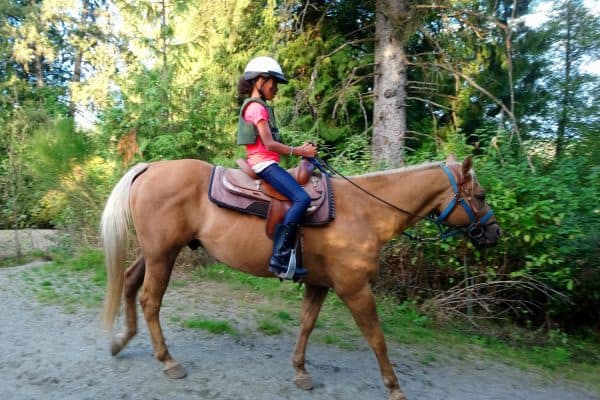Disclosure: This post may contain affiliate links, which means we may receive a commission if you click a link and purchase something that we have recommended. While clicking these links won’t cost you any extra money, they will help us keep this site up and running! Please read our disclaimer for more details. Thank you for your support!

Do you ever feel like your eleven-year-old daughter’s ears have stopped working? Not in the sense that she can’t hear you, per se, but more like she’s lost the ability to take sounds and process them into meaningful information? Sometimes it seems like she’s inhabiting a world of her own, one to which you are not invited.
Kind of frustrating, isn’t it?
Where is that sweet little girl who was so eager for connection a few short years ago? Is she hiding in there somewhere behind the increasingly long, dagger-like glares that we can only assume are her attempt at self-control? And if so, what might you be able to do to pull her back out?
A time of extreme growth and change
One of the greatest joys of motherhood is the relationships we build with our children. The mutual understanding, the shared memories, the overwhelming love. But when you’re parenting tween daughters, these things can feel insufficient in the fight to stay connected. Hormones are kicking in, their self-identities are emerging, and their emotions can be, well, out of control. We want to be close to them, but it’s so hard when we feel like we’re being pushed away.
Hopefully, if we’re honest with ourselves, we can relate to what they’re going through, at least a little. I remember being ten and feeling a distinct shift in how I defined myself. I was relatively new to my school and had been put in a class where I only had one friend. I desperately wanted to fit in and have people like me, so I did whatever I could to become the person I thought they wanted me to be. This involved withdrawing quite drastically from my family and carving out an identity that was mine alone, or so I thought at the time.
I don’t believe that all tweens feel the need to separate quite so far, but there is in an inevitable distance that threatens to assert itself, no matter how close the relationship has been thus far. The physical, psychological, social, and emotional changes your tween daughter is going through make it impossible for things to stay the same.
But that doesn’t mean that they have to get worse.
The bright side of parenting tween daughters
During their sunnier moments, tween daughters are an absolute delight to be around. They fill the house with energy and music. They talk more than you ever thought possible. They experiment with new skills by baking goodies, helping with younger siblings, creating art that demonstrates a deeper level of thinking. Tween girls have a zest for life that is contagious; they want to do and try everything, and they’re persuasive enough to get you on board too (read: they’ll grind you into the ground until you give in).

Yes, she can sometimes be difficult to be around. Her temporary inability to absorb and process instructions can be infuriating and can make you feel like you’re nagging her all the time. But this doesn’t have to be a painful relationship. There are specific steps you can take right now to build a better connection and make parenting your tween daughter a more pleasant experience for both of you.
Building a better connection with your tween daughter
This is an ongoing issue in our house. With three daughters, spaced out quite a bit, we are facing something like ten years of parenting tween girls. (Don’t even get me started on how many years we’re going to have with teenagers!) I’ve tried to cultivate as many positive habits for developing better connections with each of my daughters as possible, but I still fall short much of the time.
For this article, I reached out to my daughters and my friends—in addition to combing through my own archives of strategies—to bring you a comprehensive list of tips you can implement right now to build a better connection with your daughter.
Most of these ideas do not require a financial commitment, but I will warn you up front: they all require an investment of another precious resource—your time. It will be very difficult to establish a better connection with your daughter without investing time in the effort. This is because most kids share the love language of quality time, so spending more time with them increases the likelihood that they feel loved.
If you feel like you don’t have enough time to take on any of these activities, read my post on how and why you need to slow down.
1. Say ‘yes’ when they least expect it.
Let’s be real: tweens are not shy about asking for what they want. With two tween daughters in my house all day, I’m faced with a constant barrage of requests. So many, in fact, that I have to tune most of them out, or just flat out refuse without consideration. It’s not that I want to make their lives more difficult; I just literally don’t have the processing capacity to filter and assess all of my tweens’ requests.
But sometimes a request jumps out. Perhaps it’s something they’ve asked for repeatedly, or something that—though it may require an investment of time or energy on your part—has the potential for real and lasting benefits for our daughters. It’s often these bigger asks that they expect us to say ‘no’ to, but these are the ones that deserve the most attention from us, the ones that we really should try to allow, if at all possible.
That is NOT to say that we should buy them everything they ask for, not by a long shot. But some investments are, of course, worthwhile. For example, this summer, our girls wanted to go to a seasonal theme park as a family. My husband and I really didn’t want to go…the money, the lines, the crowds, the cranky baby…you get the picture. But we knew the benefit that could be derived from having a day-long family adventure together, so we compromised with them and spent a day doing a series of fun activities that included a smaller, more manageable theme park.
They hadn’t really expected us to say ‘yes’, and we didn’t want to, but in doing so, we were rewarded with one of the most memorable experiences of our summer.
Try to surprise them by saying ‘yes’ when it counts.
2. Work on a project together
Working together towards a shared goal is a fantastic way to bond with your tween daughter. A project gives us a reason to team up intentionally for a specific period of time without making it feel like we’re trying too hard to connect. (It’s got to feel natural if it’s going to be effective, right?)
For example, over the summer, my two tween daughters wanted to put on a theatre camp for their friends. They would write the plays and music, direct and choreograph, and host a performance in our backyard. Overly ambitious, yes, but this was a hard thing to say ‘no’ to. See point #1 above.
At each step of the way, they needed help and I had the unique opportunity to support them through the process. From editing their plays, to taking them shopping for supplies, to budgeting, to supervising the rehearsals and troubleshooting technical issues, I had ample opportunity to connect with my tweens and their friends. It was their project, but I was their assistant, their Girl Friday, if you will.
They felt loved, supported, and understood, and I felt like we’d moved our relationship to a whole new level.
3. Take her on a date
If you have multiple children, this is especially important. It’s so hard to connect deeply with a child when they’re always part of a group.
Removing yourselves from your regular environment for some one-on-one time can really help you connect with your tween. Take her to a coffee shop and give her all your attention. (Hint: leave your phone at home or turn it off). Ask her about her day, or week, or any other subject that might be top of mind. Show her that she is important enough to you to deserve her own special time in your calendar.

4. Host a book club with some of her friends
As our tweens get older, their friends become increasingly central figures in their lives. Their identities are becoming less dependent on their families and are influenced more deeply by the people they associate with. An important aspect of staying connected to your kids through this transition is to get to know their friends.
When I was a kid, I had one friend whose mom was so good at this. She took the time to know all of her daughters’ friends on a personal level. She didn’t just know our names or where we lived; she built relationships with each of us that were deep enough for her to speak into our lives or even discipline us when needed. She earned our respect, and in return, she had a deeper connection with her own kids. Hers was the house where we all wanted to be, where we could be ourselves and express ourselves in whatever way was current at the time. She created a safe and welcoming environment, and it worked.
One way to get to know your kids’ friends better is to host a book club. This especially works well for homeschoolers, but I think it could work equally well with traditionally schooled children providing you can find a time that is convenient for all participants.
Hosting a book club allows you to engage in dialogue with each kid and hear what’s on their minds. It establishes rapport and builds connections not only between you and your kids, but also between both you and your kids and their friends.
Read about how we used the Readers in Residence program to host a book club with our kids’ friends.
5. Volunteer together
Volunteering is a fantastic relationship builder. Case in point: In the first three years that I attended our current church, I didn’t really develop any friendships. I knew a few people and occasionally chatted with them after the service, but I didn’t build any meaningful relationships.
All of that changed when I began volunteering regularly. I signed on to lead a couple initiatives in the church, and suddenly I knew everyone. As we worked side-by-side in various ministries, we opened up our hearts to each other on any number of subjects. Some of my closest personal relationships developed out of these activities and continued on long after the ministries came to an end.
Like working on a project together, volunteering gives you a shared mission to bond over. It also equates to more time spent together, a prerequisite for connection.
In our church, I have volunteered as a sound technician for about seven years. In the past year, my two tweens have started volunteering with me in this ministry. That means that once a month, we come to church an hour and a half early together and set up all the technology needed to make the service sound great. I teach them about the equipment and how to troubleshoot when it fails. Then we clean up together after the services are over.
The benefits to this are many. Besides deepening our connection, it sows in them a heart for ministry. It helps them develop new skills and grow in responsibility. It makes them feel like valuable, contributing members of our church.
Moreover, the connection spills over into other areas of our life. For example, when we ran the theatre camp mentioned earlier, we were able to practice our sound engineering skills together in the development of the music for the shows. I see now that the different activities we do together intersect to form a strong web of connections between us, fortifying our bond even further.
One thing I have not tried yet but would like to in the next couple years is to take a missions trip with one or more of my tweens. I think this would be in invaluable activity to build on the connections we’re already establishing.
6. Celebrate family night weekly
There is a family in our community with whom we are particularly close. We so admire their parenting approach and often reach out to them for advice in hard times.
A couple years ago, they told us about how they’ve kept a standing weekly family night for many years. Even though their kids are now in their late teens and early twenties, they still uphold this tradition.
Once we heard about this, we knew we had to try it. Our kids were pretty young at the time, but we knew it was something we should start right away and continue on through their teen years.
One night a week, we get together for some quality time as a family. We rotate responsibility for selecting the activities, and the kids take joy in planning out their turns weeks in advance.
This night is a sacred tradition in our home. Very few things are allowed to interfere with our family night. Even when we’re tired or have a lot to do, we give it the same reverence we give the Sabbath. We do it anyway!
Here are some of our favourite family night activities.
- Pizza and a movie at home
- Going out for ice cream
- Bible study
- Talking together about our kids’ dreams and passions
- Going to a theme park
- Going for a walk and then out for coffee/hot chocolate
- Dance party
- Fancy dinner at home
- Playing a game
Here are some of our favourite games to play with our older daughters:
7. Teach her something she wants to learn
Every so often, my tween daughters will admit that there’s something I know more about than they do. (We’ll see how long that lasts!) I feel honoured when they take an interested in something I love and want me to teach it to them. Unfortunately, there isn’t always time to give them a thorough lesson.
Setting apart a few hours on a weekend to give your daughter a tutorial on a favourite topic is an excellent way to show her that she is important to you. She gets to learn something new, you get to pass on your knowledge, and you’re building a bond with each other over a common interest.
Here are some things your daughter might like to learn from you:
- Photography
- Cooking or baking
- Flower arranging
- Crocheting or knitting
- Mowing the lawn
- Making a meal plan
- Grocery shopping
- Putting together furniture
- A computer program (my kids loved working through the Hello App Inventor! book with me)
- Plant identification
- Gardening
- Songwriting
- Painting
- Decluttering
8. Let her teach you something she is good at
On the other hand, my kids frequently discover things at which they are already much better than I am. In this case, asking them to teach us boosts their confidence and gives them a chance to show off their immense skills and talents. It also teaches them that we value their knowledge and their willingness to share it. My daughters love teaching me about drawing, using new technologies (if you can’t figure something with buttons out, give it to a nine-year-old), and dragonology.
9. Read her favourite books so that she has someone to discuss them with
One my eldest daughter’s biggest complaints is that nobody she knows reads her favourite books, so she has nobody with whom to discuss them. To be sure, this doesn’t stop her from talking about them all the time anyway, but she’d really like someone who can reciprocate with their own insights.
At the speed she reads, it’s impossible for me to keep up with her, but we do try to read some of her books when possible. Audiobooks are great for this because we can listen to them in the car, ensuring that we get through them in a timely manner.
One of our favourite series to listen to together is the Ascendence Trilogy by Jennifer A. Nielsen. (Warning: it’s pretty violent). We get these disks from our library a couple times a year, but you can also get them on Audible if your library doesn’t have them. You just have to search for the individual titles: The False Prince, The Runaway King, and The Shadow Throne.
10. Do Bible study together
As our girls have gotten older, one thing we’ve come to value highly is the conversations we have with them through our shared Bible studies. It’s wonderful to find out what they’re thinking in terms of faith and discuss any questions they might have.
This year we started using the Jesus Meet Me Bible study method and workbook. While not directly written for kids, we’ve found the methodology to be really adaptable for our tweens. We spend thirty minutes per day discussing the various aspects on a passage. We do four-six verses at a time, and usually spend a week or so on that content.
It has been the perfect way to dive deeper together into the Bible in a more disciplined, yet flexible manner.
11. Have a cook-off
By nine or ten, many kids have developed a strong interest in learning to cook. They may have even started developing a few signature recipes of their own.
Why not host a family cook-off to help them showcase their skills? Pick two or more family members to compete head-to-head. It could just be your kids, or it could you be you against them. Set out five or six random ingredients in two piles and set a timer for an hour. All options are on the table for creating your masterpieces.
Let your husband or other children be the unbiased judge and enjoy the delicious (or, at least, interesting) works of art.
12. Maintain a “How can I pray for you?” whiteboard
For as long as I’ve known her, and likely much longer, my best friend has kept a whiteboard in her kitchen with a simple phrase written at the top: How can I pray for you?
Every time I go to her house, a new set of prayer requests paints a picture of her family’s current life situations. I think this is such a fantastic way to connect with your kids, especially in a busy household. On the days where you don’t have time to sit down for a full Bible study or even a deep conversation, this prayer board can serve as a communication device, keeping everyone apprised of each other’s needs. Discussions about those needs may occur before or after they’ve been added, but either way, your tweens will know that they are supported in their areas of struggle.
13. Wear coordinating outfits
This one may not be for all kids—I think it really depends on their personalities—but my kids love it.
Last year, I started taking part in style challenges to help me cultivate a wardrobe that I actually liked and figure out what style of clothes I preferred. I know—you’d think I would have checked that box by now, but I found that I was constantly buying things that I thought I loved only to donate them to the thrift store a few months later when I realized how washed out they made me look. Participating in style challenges was a way for me to learn more about what pieces work together and slowly build up a solid capsule wardrobe.
Well, my fashionista daughters wanted in on this. So, they played along too. We didn’t buy perfectly matching outfits, but we tried to have a common theme, i.e. all wearing graphic tees, or all wearing dresses with boots. It was so much fun planning our outfits together, and not only did it help us bond, but it also taught them important life lessons about choosing their clothes wisely.

If coordinated outfits aren’t your thing, how about matching pajamas? Patpat has the cutest family pajama sets, and they make the perfect addition to your Christmas Eve boxes or similar tradition. Inspired by the “Christmas Jammies” videos, I ordered us a set last Christmas, and we had the best time wearing them together. It’s still a weekend tradition for us to wear them on Saturday mornings when we’re all home.

14. Take her on a birthday trip
If you can swing it, taking your tween daughter away for a one-on-one weekend adventure is the ultimate bonding experience. I first had the idea for this when reading Pass It On, an excellent resource on parent-child traditions that help pass your faith onto your kids. While this was not actually suggested in the book, the book sparked the thought.
When my first daughter turned ten, we went to a nearby city for two days and nights. I did everything I could to make it amazing for her. On the morning of her birthday, I gave her a handmade gift certificate announcing this mystery adventure. Then, before we went, I had several important adults in her life write encouraging letters to her, which I arranged in a new journal that I planned to give her on the trip.
We stayed in a modern B&B, and she got the room with the huge TV in it, a rare treat for her. I don’t even want to know how many movies she watched before I woke up each day. We went for walks, ate at cafes, took her first trail ride, saw a movie, and went swimming—basically everything she loves to do but doesn’t usually get a chance to. We visited a church we’d never been to and ate dessert every day.
When I asked her for this article when she felt most connect with me, this trip was one of her first examples. She still talks about it all the time, and the expectation has already been set that each of her sisters will receive the exact same treatment for their tenth birthdays.

15. Eat dinner together
In a busy family, eating dinner together is often easier said than done. Dad may not get home until after the little ones need to be fed, or older kids may have evening classes that keep them out of the home. Whenever possible though, I think it’s so important to eat dinner together. It’s a good opportunity to catch up on each other’s days and relay any new developments.
If conversation ever lulls (which it rarely does when you have a house full of girls), we like to play a dinner table game. Our favourite goes like this: One person chooses another and asks them a multiple choice question, such as, “If you could have any career you wanted, would you rather be a pilot, an opera singer, or a journalist?”
The one who is asked the question decides on the answer in their head, but doesn’t speak their answer aloud. Then you go around the table and each person guesses what the person’s answer will be. Finally, the person reveals their answer and their reason why. There are two variations on this simple theme. First, the people guessing can offer their reasoning for their guesses. Alternatively, they can try to persuade the askee that their answer is the one that they should choose. You can actually learn a lot about people through a game like this.
16. Do nothing together
This was my daughter’s other favourite connection activity and it probably requires the least amount of effort of anything on this list. She literally said, “I like it best when we all come into your room in the morning and just cuddle and talk and do nothing.”
When I asked her why this was so important to her, she said, “I like it because nobody is in trouble or fighting and we don’t have to be doing anything.”
What I love about it is how we can just all be present in that moment, being silly, doing nothing, and not worrying about everything that will eventually need to be done. It’s a rare moment when we can all just relax and enjoy each other’s company.
17. Have a dance party
When all else fails, throw a dance party. Seriously. This is my go-to in every difficult situation. Let the kids pick the music (Pharrell’s Happy and Will.I.Am’s I Like to Move It are perennial favourites in our house), crank it up loud, and then dance like crazy. If you’re really adventurous, you can add in an air band element. See who can play their imaginary instrument the most dramatically. This always delights kids.
18. Redecorate together
The tween girls I know love getting the chance to make over a space. I think it’s because they’re bursting with so many ideas, and they enjoy having control over something so big. This is such a fun outlet for that creativity and those budding leadership skills.
Let them come up with a plan for rearranging the living room furniture or for giving their room a new look. Like taking on a project together, you will have to work together toward your shared goal. Nothing says “I love you” like moving a too big couch through a too small hallway together or trying to assemble Ikea furniture. In all seriousness though, this activity shows your daughter that you respect her ideas and value them enough to let her make important decisions that will impact the whole family.
19. Keep a shared journal
I haven’t tried this yet, but it’s high on my list of things I want to start doing to improve communication with my tween daughters (and my other kids, when they’re old enough). It’s a delightful way to get to know your girls better.
Basically, you keep a journal together, passing it back and forth like a secret note in math class. You can hide them under pillows or place them on nightstands as a means of transference. Pour your hearts out to each other and experience an entirely different level of bonding than you may be used to.
You could use a blank journal for this, or Amazon has several that are set up with varying degrees of writing prompts. Here are a few you may like to check out.
20. Pray together
Honestly, nothing makes me feel closer to my daughter than listening to her pour her heart out to Jesus.
Before the kids took to the stage for their performance this summer, the entire cast was struck with a bout of stage fright. There were tears all around, even from the most seasoned performers. My daughter announced, “We’re going to pray about this because I can’t think of anything else to do.” I agreed and my friend helped gather up all the kids and take them inside where it was quieter. They formed a small circle and my daughter started praying over their performance and committing all of their fears to Christ. Honestly, it was the highlight of the entire experience for me.
When we pray together, we are reminded that we are not just mother and daughter, not just two people with strong opinions trying to survive in the same house. We are both children of God. We are both sinners in need of a Saviour. We both have fears, doubts, and insecurities that we long to cast on Him.
Praying together breaks down the walls that may be separating us and unites us not only emotionally but also in spirit. It puts us on a level playing field and allows the Holy Spirit to reign in our relationship.
This is a bond that cannot be broken.
What’s your favourite way to connect with your tween daughter?
Have you tried some of these activities? Do you have something to add to the list? Leave a comment below and let us know your favourite way to bond.

Sophie Agbonkhese is a writer, homeschooling mother of four, and a recovering overachiever (who occasionally relapses). She is the founder of My Cup Runs Over, a site dedicated to helping busy women simplify and enrich their lives. When she’s not writing or debugging websites, Sophie spends her time reading, dancing, bullet journaling, reading, gardening, listening to audiobooks, and striving fruitlessly to have a clean house for at least five minutes.









Skye
Thursday 15th of June 2023
Hello, I am a little young to be a mother of a 12y/o but, I am allowing my younger sister to move in with my fiancé and I(both 20y/o). We come from troubled homes and she caught the more severe end, I was lucky to be adopted out by a family member but she has been in the home since. I am finally in a place to take her and I want to make her feel loved and included in our home.
I really liked the Shared Journaling Idea, she and I both suffer with anxiety. Opening up can be intimidating, I want her to be able to talk to me without the stress of being face to face bearing her heart.
Thank you for your Ideas!
SOPHIE AGBONKHESE
Monday 7th of August 2023
Hi Skye,
I'm sorry to hear that. That sounds like a really tough situation, but I'm glad to hear you're doing better and are able to help your sister. Shared journaling sounds like it could be a really good way for you to increase communication with your sister.
Erin Gram
Thursday 2nd of January 2020
This is a fabulous list. Thank you so much for it!
I have a 12-year-old daughter and am very aware of how intentional I need to be to make sure I maintain a strong connection with her. Our kids crave our time and attention so much.
This has inspired me with new ideas to share with her.
Thank you again!
Sophie Elise
Thursday 2nd of January 2020
Thanks so much. This is such a precious stage and also a very enjoyable one when we take the time to connect with them.
Jodi from Wealthy N Wise
Wednesday 3rd of October 2018
Sophie I LOVE these tips! My daughter isn't quite tween years yet but I'm going to pin this one so that I can keep this in my back pocket for the upcoming years. (although I think lots of these would work now too!)
I did do the shared journal with my sisters when I was away at college... we wrote in them and then mailed them once per month! It was fantastic and I think doing the same with my daughter would be even better!
Thanks for these awesome ideas!
Sophie Elise
Wednesday 3rd of October 2018
Thanks so much, Jodi. That's amazing that you and your sisters kept a shared journal long-distance in the pre-Internet revolution days...I think that, collectively, we had a lot more patience back then. I hope you and your daughter make some amazing memories together!